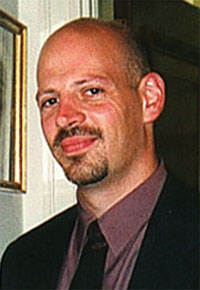 Benn Tannenbaum |
Tannenbaum's interest in the public policy aspects of science began when he was a graduate student. He helped found the Graduate Student Association at Fermilab, which acted as a liaison between the graduate students and the lab's Directorate.
As the CDF representative on the Association, Tannenbaum traveled to Washington, DC to meet with funding and policy agencies, as well as science aides to Congressmen. He currently chairs Fermilab's User's Executive Committee- which acts as a liaison between the users and the directorate of the lab, as well as representing their interests in Washington-and is an active member of ArmsNet, a subgroup of the Union of Concerned Scientists that focuses specifically on arms control issues, including national missile defense. He even helped prepare a position paper in April 2001 for Senator Dianne Feinstein (D-CA), which led to proposed legislation requiring a sound scientific rationale for any NMD spending.
Tannenbaum is also a strong advocate of increasing scientific literacy. While at Michigan State, he helped found Science Theater, an NSF-sponsored group that designed demonstrations to interest students and the general public in science and physics. The group has performed at schools, at local malls, and for girl scout troops, and in 1993 received the AAAS Award for Public Understanding of Science and Technology.
Given his extensive background in public policy, it isn't surprising that Tannenbaum eventually sought out a Congressional fellowship, where he hopes his skills and experience as a physicist, communicator and teacher will prove useful. "These are tumultuous times for our country, and I believe that scientists have a special obligation to society," he says. "It is our responsibility to keep both our government and the general public informed as to what science can and cannot do to protect our nation." He initially identified technology transfer, science funding and world scientific leadership as the areas he would most like to focus on as a fellow, but in light of last year's terrorist attacks, he has expanded that list to include foreign relations and intelligence and other national security issues. "These are rather complex, disparate tasks," he admits. "But they all require a scientist who can work with politicians to design equitable solutions."
In September, Tannenbaum will join nearly 100 other Congressional fellows from other scientific societies for a special orientation session sponsored by the AAAS, followed by an intensive interviewing process to decide where he will spend his fellowship year. As of now, he is keeping an open mind as to whether he will choose to work in a Congressional office or on the staff of a Congressional committee.
©1995 - 2024, AMERICAN PHYSICAL SOCIETY
APS encourages the redistribution of the materials included in this newspaper provided that attribution to the source is noted and the materials are not truncated or changed.
Associate Editor: Jennifer Ouellette
August/September 2002 (Volume 11, Number 8)
Articles in this Issue

